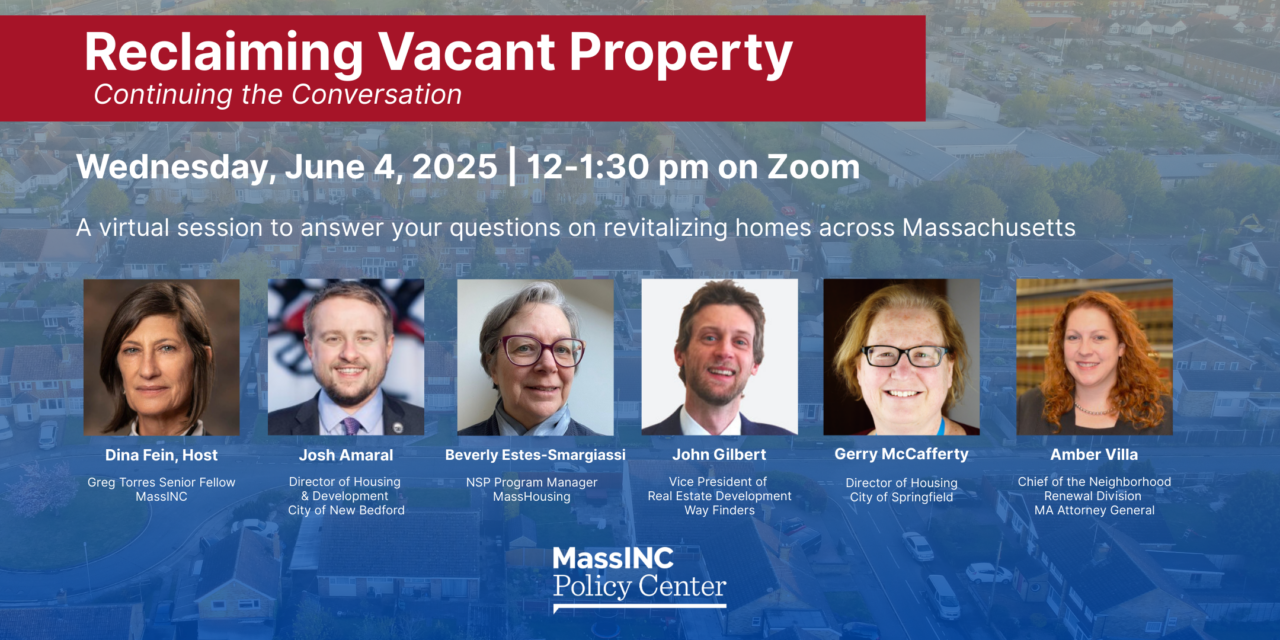MassINC’s latest virtual convening brought together housing experts, nonprofit developers, municipal leaders, and policymakers to continue the urgent conversation around reclaiming Massachusetts’ vacant and distressed properties. Building on the momentum of April’s in-person event, the discussion delved deeper into practical strategies, legal pathways, funding mechanisms, and early implementation models aimed at transforming these properties into affordable first-time homeownership opportunities.
Key Themes & Highlights
Legal & Procedural Tools for Property Reclamation
Receivership and Tax Title Foreclosure remain cornerstone tools for municipalities tackling blighted properties. The discussion underscored:
- Receivership Reform through the Affordable Homes Act, allowing courts to transfer ownership to qualified nonprofits “as-is,” conditional on rehabilitation and affordability guarantees.
- Updated tax title procedures now align with the Supreme Court’s Tyler v. Hennepin County decision, ensuring former owners may receive surplus equity after municipal foreclosures.
- Legal nuances and timelines were illustrated through successful case studies in Springfield and New Bedford, showcasing how courts, housing agencies, and cities can collaborate efficiently.
Funding Solutions: Layering Capital to Make Projects Viable
A clear takeaway: reclaiming distressed properties is capital-intensive and often not financially self-sustaining. Presenters highlighted several funding streams enabling progress:
- Neighborhood Stabilization Program (NSP) – MassHousing’s flagship funding initiative supports 1–15 unit properties for ownership or rental. Up to $250,000 per affordable unit is available, with a $2M cap per project.
- Commonwealth Builder Program – Designed for larger-scale, new homeownership developments in Gateway Cities, with up to $250,000 per unit at ≤100% AMI.
- Local and Federal Sources – Cities are leveraging CDBG, HOME funds, CPA allocations, and municipal housing trust funds to close funding gaps.
Importantly, panelists emphasized that funding is not always the bottleneck — probate, title, and zoning issues often delay or derail projects.
Implementation in Action: Community-Led Pilots
Real-world applications shared by Wayfinders and local officials from Springfield and New Bedford gave participants a blueprint for scalable action:
- Springfield’s two-phase pilot illustrates how pairing tax-title and receivership pipelines with nonprofit developers can create ownership housing instead of rental conversions.
- In New Bedford, a Vacant Property Working Group coordinates city departments to assess, prioritize, and match properties to local housing needs.
- Properties acquired through both RFP and SAR (Special Attorney Receiver) pathways were reviewed, revealing long timelines (up to 16 months) and complex legal handoffs.
These projects also stress the importance of zoning flexibility, strategic property bundling, and due diligence — especially around environmental and structural conditions.
Capacity Building & Future Planning
The conversation closed with forward-looking insights:
- Law school clinics may soon offer estate planning support to low- and moderate-income homeowners to reduce title issues over time.
- The Attorney General’s Office is increasing its support to receivers with forgivable loans of up to $250,000 to tackle high-risk properties.
- There’s an open call for collaborative modular housing strategies to reduce construction costs through scale.
As Massachusetts continues to grapple with a growing housing crisis, reclaiming its inventory of vacant properties represents both a challenge and a crucial opportunity. This forum reaffirmed that while no single tool is sufficient, a coordinated legal, financial, and civic strategy — grounded in affordability and community equity — can create lasting pathways to homeownership and neighborhood revitalization.
MassINC thanks all panelists and attendees for advancing this vital conversation. To stay involved or access follow-up resources, please contact the MassINC team or visit our Housing Policy page.
